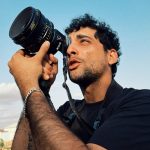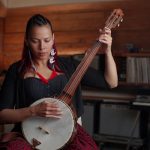Dubai-based Iranian filmmaker Mahshid Zamani recently produced UAE: 350 Maybe Less, a 25-minute environmental awareness documentary. UAE: 350 Maybe Less was produced to make UAE residents more conscious of their excessive water and energy consumption, according to Zamani. It examines the nature of the countrys high ecological footprint, its impact and simple solutions that can […]
 Dubai-based Iranian filmmaker Mahshid Zamani recently produced UAE: 350 Maybe Less, a 25-minute environmental awareness documentary.
Dubai-based Iranian filmmaker Mahshid Zamani recently produced UAE: 350 Maybe Less, a 25-minute environmental awareness documentary.
UAE: 350 Maybe Less was produced to make UAE residents more conscious of their excessive water and energy consumption, according to Zamani. It examines the nature of the countrys high ecological footprint, its impact and simple solutions that can be taken to reduce consumption.
350 parts per million (ppm) is what scientists say is the safe upper limit for carbon dioxide in the atmosphere. We are currently at 390 ppm so we need to get below 350, explains the filmmakers.
Zamani, who studied cinema in Iran is a well known film critic and has a reputation in the Arab market for creating socially-relevant documentaries.
For 350:Maybe Less, the team used a Canon 7D as the primary camera while a Sony XDCAM 350 served as the secondary camera.
The films director Kamil Roxas calls the 7D his obvious choice.
This is a very compact camera but still has a wonderful depth of field. We also used a Sony XDCAM 350 camera. Sound was recorded with a Sennheiser 416 via a Sony PD150, he says.
Besides a few technical challenges such as an overheated battery after continuous video recording with the 7D, no moveable viewfinder for the camera, and the challenge of syncing sound with the video footage in post production, the project was trouble free, according to the director.
Zamani, who owns a production company in Dubai Studio City, clarifies that she does not make commercial films.
We dont prodcue commercial works at all. We only produce documentaries on social causes, she says.
Her films are sometimes financed by Caspian Events, her event management consultancy and promotion company, which works with local and international clients to bring fine arts and cultural events to the United Arab Emirates.
She adds that her firm has been involved in several documentary projects and follows a guerilla style of filmmaking.
Last year, we produced a documentary called Make Me Perfect, which is a film about autism and focuses on Dubai Autism Centre, she explains.
It always takes a huge amount of time and effort to make any documentary, but it is crucial that we make them for society. Documentaries require a lot of patience because you have no idea what reality will offer you and if what it offers can be portrayed in an interesting manner in your film. For making any documentary, motivation is key.
We have enjoyed working as independent filmmakers. For this project, we had a very small crew as our budget was a little under US $27,000. That often means that we have to wear many hats; everyone on set has to double up as a gaffer, cinematographer or sound technician as the need arises. If we had a bigger budget, we would have liked to explore shooting underwater as well, she explains.
Theres also a lot of work in post as well because we then have to add the narration, music, and visual effects.
Besides the many hats she dons as filmmaker and business woman, Zamani is also managing director of a film symposium called Documentary Voices, a regional platform that conducts screenings, workshops on documentary film production and discussion panels to develop and empower filmmakers while also informing the public.
The third edition of Documentary Voices was held last month in conjunction with Dubai Culture & Arts Authority. The four-day programme included workshops on screenwriting and producing, directing, lighting, editing and sound. The objective was to highlight the importance of sustainable lifestyles and green living through the medium of films.
Documentary Voices is a one-of-a-kind film platform that aims to educate the younger generation on documentary making while involving the whole community by focusing on a social issue. We produce documentaries as part of our programme to boost the UAE film industry, she explains.
UAE: 350 Maybe Less is tentatively scheduled to be screened at DUCTAC, Mall of the Emirates in February.














































































